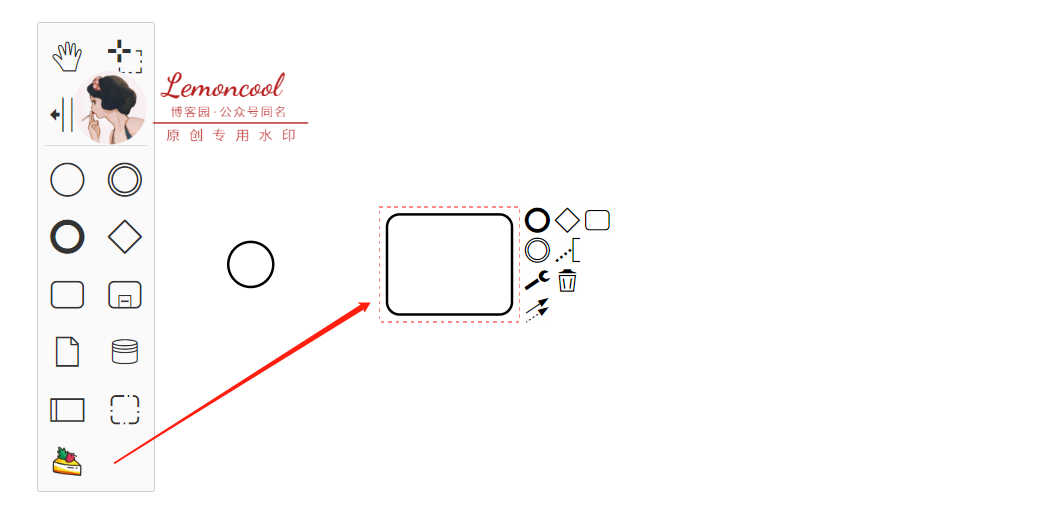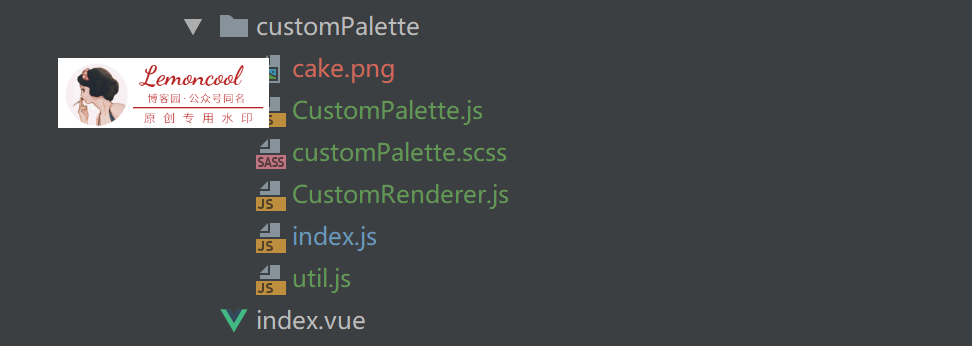vue项目中使用bpmn-自定义platter
内容概述
本系列“vue项目中使用bpmn-xxxx”分为七篇,均为自己使用过程中用到的实例,手工原创,目前陆续更新中。主要包括vue项目中bpmn使用实例、应用技巧、基本知识点总结和需要注意事项,具有一定的参考价值,需要的朋友可以参考一下。如果转载或通过爬虫直接爬的,格式特别丑,请来原创看:我是作者原文
前情提要
经过前四篇的学习,我们能够实现bpmn基本绘图、预览、为节点加事件加颜色等效果,这一篇我们来说,如何自定义左侧工具栏(platter),首先看一下自定义前后效果图对比:

我们本次要实现的目标:基于左侧platter原有元素类型,创建出一个新的自定义节点。暂且叫它“草莓蛋糕”节点,类型是 bpmn:Task, 样式我们自己找一个好看的小草莓蛋糕图案。所以,开动吧~首先新建一个“customPalette”文件夹,里面放我们今天所有自定义的文件。
步骤1:建立platter类函数,命名为CustomPalette.js

export default class CustomPalette { constructor(create, elementFactory, palette) { this.create = create; this.elementFactory = elementFactory; palette.registerProvider(this); } // 这个是绘制palette的核心,函数名不要变 getPaletteEntries() { const elementFactory = this.elementFactory; const create = this.create; function dragEventFactory(type) { return function (event) { const taskShape = elementFactory.create('shape', { type: type }); create.start(event, taskShape); }; } return { 'create.cake': { title: '我是自定义节点-草莓蛋糕', // 鼠标悬浮到节点上显示的文字 className: 'icon-custom bpmn-icon-cake', // 样式名 action: { // 操作该节点时会触发的事件,此时只注册一个拖动事件即可,否则拖动时没有效果 dragstart: dragEventFactory('bpmn:Task') } } }; } } CustomPalette.$inject = [ 'create', 'elementFactory', 'palette' ];
此时,我们已经注册好了一个名称为“create.cake”的节点,拖动它时,画布中会出现一个"bpmn:Task"类型的节点,此时需要将该文件导出并在页面中引入,否则没有效果。
步骤2:在CustomPalette.js同级,建立一个index.js文件将其导出
import CustomPalette from './CustomPalette'; export default { __init__: ['customPalette'] customPalette: ['type', CustomPalette], };
步骤3:页面中(index.vue)引入index.js
import customModule from './customPalette'; export default { mounted() { this.containerEl = document.getElementById('container'); this.bpmnModeler = new BpmnModeler({ additionalModules: [ customModule ] }); }
步骤4:为节点定义样式
新建一个customPalette.scss文件,在该文件同级放一张“cake.png”的图片,作为节点的背景图写入。背景图引入的话,貌似只支持.png格式,亲测:jpg报错
.bpmn-icon-cake { background-image: url('./cake.png'); } .icon-custom { background-size: 65%; background-repeat: no-repeat; background-position: center center; }
并且在main.js中引入,注意,一定要在main.js中全局引入,否则不生效。
import 'customPalette/customPalette.scss';
此时,我们便可以在左侧工具栏中看到自定义的“草莓蛋糕”节点了,但是此时拖动该节点,右侧只会产生一个“bpmn:Task”的节点,只有一个框框。

我们希望的是,拖动后画布中也显示自定义图标,所以我们进行下一步:自定义渲染
步骤5:画布渲染自定义节点
此时需要我们新建一个 CustomRenderer.js文件,作用:自定义 renderer。因为我们是在bpmn原有的元素“bpmn:Task”基础上进行修改,所以我们需要对将BaseRenderer进行继承。

import BaseRenderer from 'diagram-js/lib/draw/BaseRenderer'; // 引入默认的renderer const HIGH_PRIORITY = 1500; // 最高优先级 export default class CustomRenderer extends BaseRenderer { // 继承BaseRenderer constructor(eventBus, bpmnRenderer) { super(eventBus, HIGH_PRIORITY); this.bpmnRenderer = bpmnRenderer; } canRender(element) { return !element.labelTarget; } drawShape(parentNode, element) { const shape = this.bpmnRenderer.drawShape(parentNode, element); return shape; } getShapePath(shape) { return this.bpmnRenderer.getShapePath(shape); } } CustomRenderer.$inject = ['eventBus', 'bpmnRenderer'];
此时, CustomRenderer.js文件大概结构完成了,注意:HIGH_PRIORITY变量和canRender不可以删掉,否则会有问题。重头戏是里面的drawShape函数。
步骤6:书写drawShape函数
我们在CustomRenderer.js同级建立一个util文件,记录自定义类型节点的一些属性。
import cake from './cake.png'; // 自定义元素的类型,此时我们只需要自定义一种节点,所以数组只有一个元素 const customElements = ['bpmn:Task']; const customConfig = { // 自定义元素的配置 cake: { url: cake, attr: {x: 0, y: 0, width: 50, height: 50} } }; export {customElements, customConfig};
现在我们来书写drawShape函数
import { customElements, customConfig } from './util';
import { append as svgAppend, create as svgCreate } from 'tiny-svg';
...
drawShape(parentNode, element) {
const type = element.type; // 获取到类型
// 所有节点都会走这个函数,所以此时只限制,需要自定义的才去自定义,否则仍显示bpmn默认图标
if (customElements.includes(type)) {
const {url, attr} = customConfig['cake'];
const customIcon = svgCreate('image', {...attr, href: url});
element['width'] = attr.width;
element['height'] = attr.height;
svgAppend(parentNode, customIcon);
return customIcon;
}
const shape = this.bpmnRenderer.drawShape(parentNode, element);
return shape;
}
步骤7: 导出并使用CustomRenderer
修改之前导出CustomPalette的 index.js文件
import CustomPalette from './CustomPalette'; import CustomRenderer from './CustomRenderer'; export default { __init__: ['customPalette', 'customRenderer'], customPalette: ['type', CustomPalette], customRenderer: ['type', CustomRenderer] };
注意:此时__init__内的属性名都不可以改,不要问为什么,因为改了报错。
步骤3中已经将该index.js引入到了页面中,此时无需再次引入,此时我们来看看效果。

后续
项目目录:index.vue是画布主页面,同级customPalette文件夹下共有6个文件,结构如下:

各个文件的代码片段在文中已经展示过了,按照步骤写下来应该是没问题的。想传源码上来,但是文件夹不知道怎么上传到博客。如想获取完整源码或有问题,可以公众号联系我,扫下面二维码或公众号搜“前端便利贴”,即可获取~



 浙公网安备 33010602011771号
浙公网安备 33010602011771号